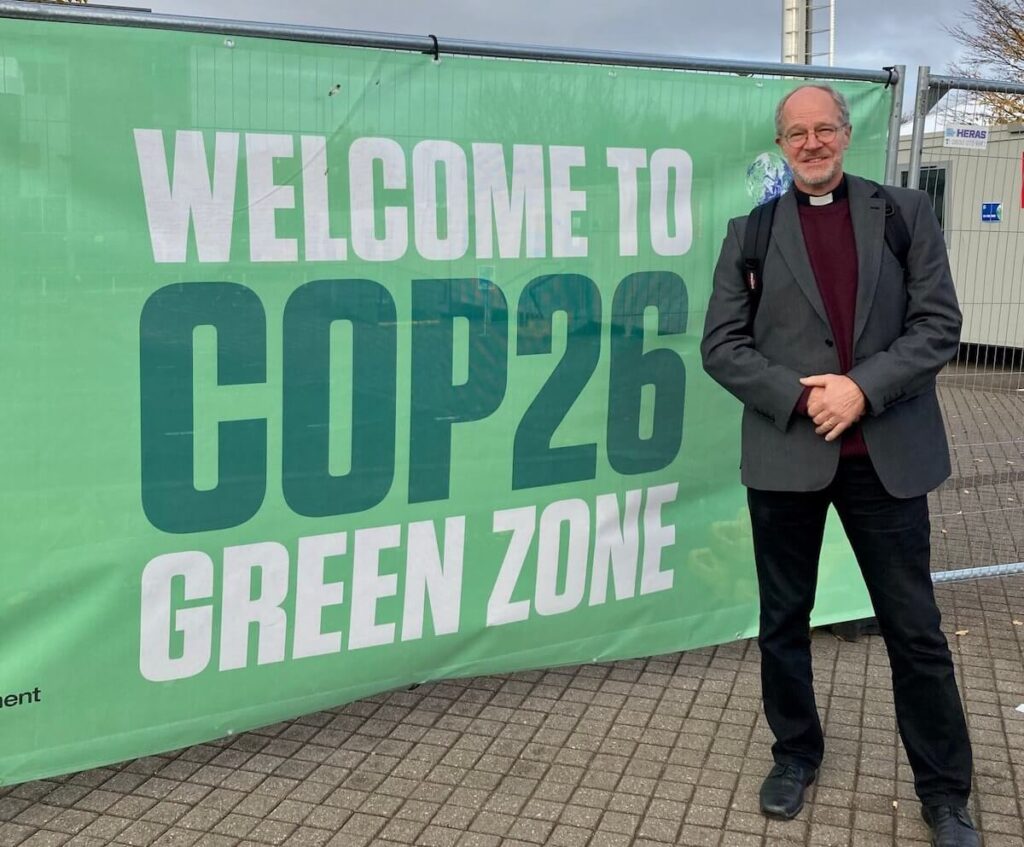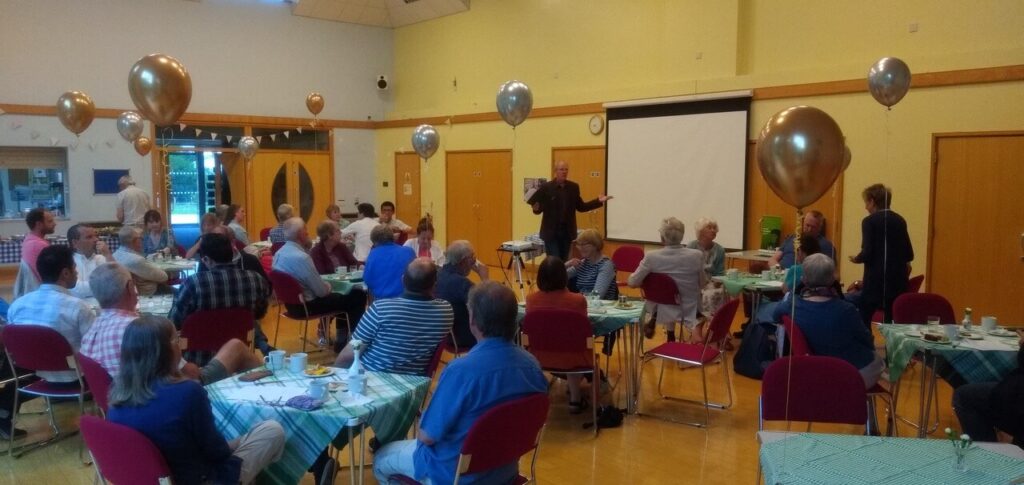You’ve all heard the old adage, ‘the only two certainties in life are death and taxes’ (Ben Franklin, 1789). Taxes, we agree. But death? Not so sure. As Christians, we think differently about death. Of course, we agree that we’re all destined to die, but that’s merely physical death. Surely, a major premise of our Christian faith is that death has been overcome by the cross, and in the future, ‘death will be no more.’ Vanquished. Eternal life will reign supreme.
Superficially, that seems a straightforward resolution to the dilemma. In the present we’ll die physically, but in the future, we’ll live eternally. Getting from here to there is a more challenging question, so leave that aside for now. But if we project forward to imagine a future without death, we run into some serious and unexpected challenges. Are we talking about a spiritual existence or a physical one? If it’s physical, what kind of physicality? Will we still eat, stub our toes, breathe air? Perhaps most importantly, what is the scope of ‘no more death’? Is it universal? Including all of creation, animals and non-human creatures as well? All of life?
In this presentation, I want to propose a simple but controversial idea: that death continues unabated in the new creation – that death is part of God’s good creation and will remain a part of new creation, and that ‘no more death’ is a narrow exception to this rule, applied specifically to human beings resurrected in Christ. I will propose that a world without physical death was never God’s intention.
This may seem purely eschatological and speculative. But my intention is to approach this question from three different perspectives – science, theology, and the Bible. Eschatology is the branch of theology assigned with the unenviable task of ‘sorting out the future’. But as human beings, we’re all concerned about the future. We look around our world today – and you can pick your existential crisis.
Science also speculates about the future (and so does the Bible) – but they do so in different ways. Science uses past and present data to project into the future. That’s what climate science is all about – and the reason for so much angst about where we’re heading. The Bible gives us glimpses of future revelation – using prior revelation to provide a ‘sure and certain hope’ for that future, based on the faithfulness of God. ‘Christ has died, Christ is risen, Christ will come again’. Yet the Bible provides seemingly contradictory pictures of that future – both of cataclysmic destruction and of glorious eternal life in a new creation. Theology’s task is in part to interpret the Bible as a coherent whole, weaving together and making sense of these contradictory strands – while also taking into account God’s other revelation – that of the world – a reality comprehended through science. So while theology is a speculative discipline, it is tethered on each side to the constraints of both the Bible and science. If either of these is let loose, theology runs the risk of sliding into empty speculation, nowhere more-so than the sub-discipline of eschatology.
Eschatology is fraught with controversy, starkly differing interpretations, and little common ground. Even when loosely tethered to a biblical perspective, it is too often blinkered by narrow pre-determined positions. So before I even broach the challenging subject of ‘death’, it’s important to ‘show my hand’ and make sure we’re all on the same page – or at least you know which page I’m on!
Much of Christian theology mistakenly emphasises ‘heaven’ as the ultimate destination of human beings – the place we go when we die. The idea of life after death is biblical to be sure, but as N.T. Wright frequently maintains, the term ‘heaven’ is never used in the Bible as a post-mortem destination for human beings. Rather, the Bible emphasises resurrected life in the age to come. And the destination of that age to come is not a spiritual heaven, but a very physical ‘new heaven and new earth’– also known as the ‘new creation’. As the name suggests, this involves the whole of creation, the whole earth. This also begs the question, what is meant by ‘new’? The heavily anthropocentric nature of the traditional view of ‘heaven’ is completely overturned when human beings are seen as merely one small part of God’s corporate plan for the whole of creation – animals, plants, microbes, earth, sea and sky – and I suggest heaven as well.
The salient point here is that whatever we want to call the afterlife – heaven, paradise, soul-sleep, or the intermediate state, it is NOT our ultimate destination. It is penultimate, merely a temporary stage in the process, and one which the Bible speaks very little about. The Greek term for eternal life – zoe aionios –reaches our ears as ‘heaven’ but would be better translated as ‘life in the age to come’ (Lk 18:30) – or what N.T. Wright so aptly describes as ‘life after life after death’. The great hope of the Christian faith is not therefore a spiritual life in heaven unencumbered by this physical world, but rather a resurrected life in a transformed body precisely within this physical world – but a world itself transformed and renewed – a new creation.
This is a horizontal trajectory, not a vertical one. There’s a strong case to be made that this was God’s plan all along – a teleological plan from creation to new creation – in which human beings were given a distinct part to play – a small but important part. Until it went wrong – leaving the great human sublot in the story – which involves rebellion, the entire OT history leading to Christ and the Gospel – good news for ALL creation – our NT mission of proclamation, Christ’s coming to reign, and ultimately the reconciliation of all things and the joining together of heaven and earth in a new creation.
In this picture we also see that the creation in Gen 1-2 is primarily a relational story, not a material one. Sin damaged all these relationships – between God & humanity, humanity and the earth, and God and the non-human creation as well. So, if creation is relational, then new creation signifies restored relationships – not a materially new creation. What is ‘new’ in the new creation is not the material stuff, but the renewed and reconciled relationships, restored and held together in Christ.
What then of death?
Theologically, the default view held by most Christians is that this world is broken or fallen – and that death came about through human sin. But if sin is a human failure, how can the rest of creation be considered culpable? In what sense is creation fallen or in need of redemption? Do frogs sin? Trees? Rivers? Can microbes be wicked or evil? Certainly theology suggests that all of creation is impacted by human sin, but that does not imply that creation is itself sinful. Rather, it is the consequences of human sin on creation which need redemption: exploitation, fear, pollution, extinctions, destruction. Some propose that God will destroy this fallen world and bring about a new and perfected creation. But if God’s answer to human sin is redemption (not destruction), why would God redeem human beings (who sinned), yet destroy the rest of creation (which did not)?
Biblically, on each day of creation, God declared it ‘good’, and this declaration has never been revoked. Physical death was always, from the very beginning, a part of God’s good creation, whether we begin millions of years ago, or with eating in the Garden of Eden. Many Christians will readily agree that predatory dinosaurs killed and devoured their prey 250 million years ago, yet still insist that this death and violence is due to a fallen world – a fall which began with two human beings in the garden 250m years later. Our theology desperately needs a more intellectually considered response than this.
But is there a problem in projecting a future world without death? Surely this is the ideal, the ultimate utopian dream realised – the power of death finally destroyed forever by life. And yet scientifically, a world without death is a world without new life. Why? Because all new life replaces old life. A new tree cannot grow where an old tree never dies. There would be no space for new grass, flowers, fields, forests, or new birth – no space for newness in the new creation, only a static perfection.
Biologically we know that all life consumes other life to survive and reproduce. Predators eat prey, herbivores eat plants, and down the food chain to microbes and bacteria. All this entails death, yet without eating, there is no growth, reproduction, aging, or change. The entire life cycle of many creatures revolves solely around eating, reproducing, and dying. For such creatures, life would be empty of all experience, purpose, or instinct. ‘No more death’ implies a radical transformation in the very nature of all matter. But the cost of such a transformation would be a complete loss of identity and purpose within the whole of present creation. Life perhaps, but not as we know it.
Continuity and Discontinuity
Why then does so much of Christian theology insist that the new creation will be free from both sin AND death? This view is driven largely by one key biblical affirmation in Revelation 21:
‘Then I saw a new heaven and a new earth, for the first heaven and the first earth had passed away’. And in vs 4: ‘There will be no more death or mourning or crying or pain, for the old order of things has passed away.’
It seems a straightforward expectation. If sin and death are hallmarks of a broken and fallen creation, then a new creation will be perfect – no more sin and no more death. This one verse is frequently taken out of context and applied universally to the whole of creation – yet the context of this passage is specifically that of God’s people – restored and resurrected to a new relationship with God. There is no intent of a universal application here. Biblically speaking, death is a spiritual problem, not a physical one. Death may be vanquished for humans redeemed in Christ, but for all of creation, death is actually the great hallmark of life, the necessary terminus of the individual which enables the flourishing, growth and development of the whole.
To highlight the problem, a simple allegory: A father and daughter are picnicking under a beautiful willow tree. The girl asks, ‘will there be trees in the new creation?’ ‘Yes of course,’ says her father. ‘But what about this tree’ she asks, ‘Will this tree be in the new creation?’
Very few scientist-theologians have thought through the implications of a radical discontinuity of death, but one is John Polkinghorne. He readily admits that death is ‘the necessary cost of life’ and a natural process of present creation. Why then does he still interpret ‘no more death’ in Rev 21 as applying to the whole of new creation? The answer lies in the radical discontinuity of his proposal of creatio ex vetere. Death, transience and finitude must be universally abolished because neither the entropy nor the evolutionary processes of the old creation will be present in the new. This is the ‘old order’ passing away. Thus a cosmic new creation must reverse the laws of matter and entropy. This is an extraordinary proposal for a scientist – effectively a complete discontinuity with present creation.
But the greater the discontinuity, the deeper the problem. How will any trees or animals continue into the new creation in the midst of a total discontinuity with present matter? Moltmann proposes the resurrection of all things from all times, but this is logically and scientifically incoherent. Polkinghorne’s reversal of natural law may be continuity of appearance, but not reality. In response to the question, ‘will this tree be in the new creation?’, Moltmann would conclude ‘every tree that has ever been will be there’; Polkinghorne would conclude ‘trees may be there – but not this tree’.
Without the continuity of death and new life, present creation has no future place in the new. But death is the very transition process God designed! if the ‘old order of things’ refers not to laws of entropy but rather to the relational brokenness of present creation due to sin… then there is no need for such a belaboured resolution as reversing the laws of nature.
In a proposal where creaturely death is maintained, the answer is simply, ‘yes – if it is alive at that time (of new creation), it will continue to live – until it dies’. Nature is not ‘resurrected’, therefore natural death continues, and natural life continues as well. God’s people are in view in Rev 21:4, resurrected life is a human exception not a universal rule, and death remains a part of God’s good creation for animals, plants, and all of life.
Christian in Science 80th Anniversary Conference – 2024, Birmingham




